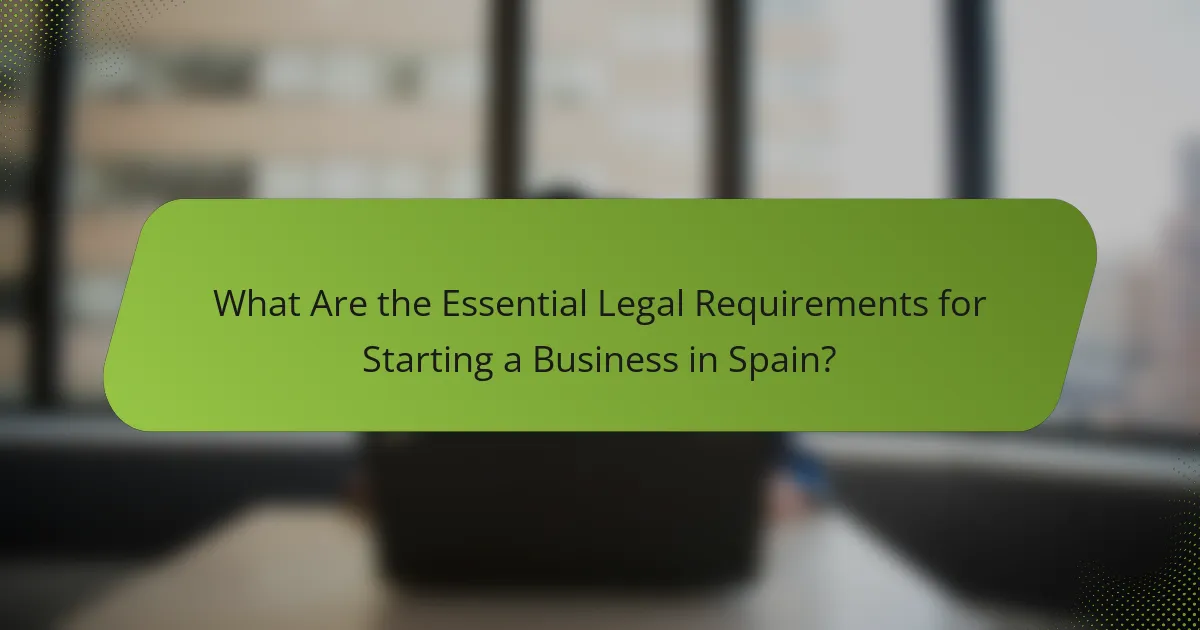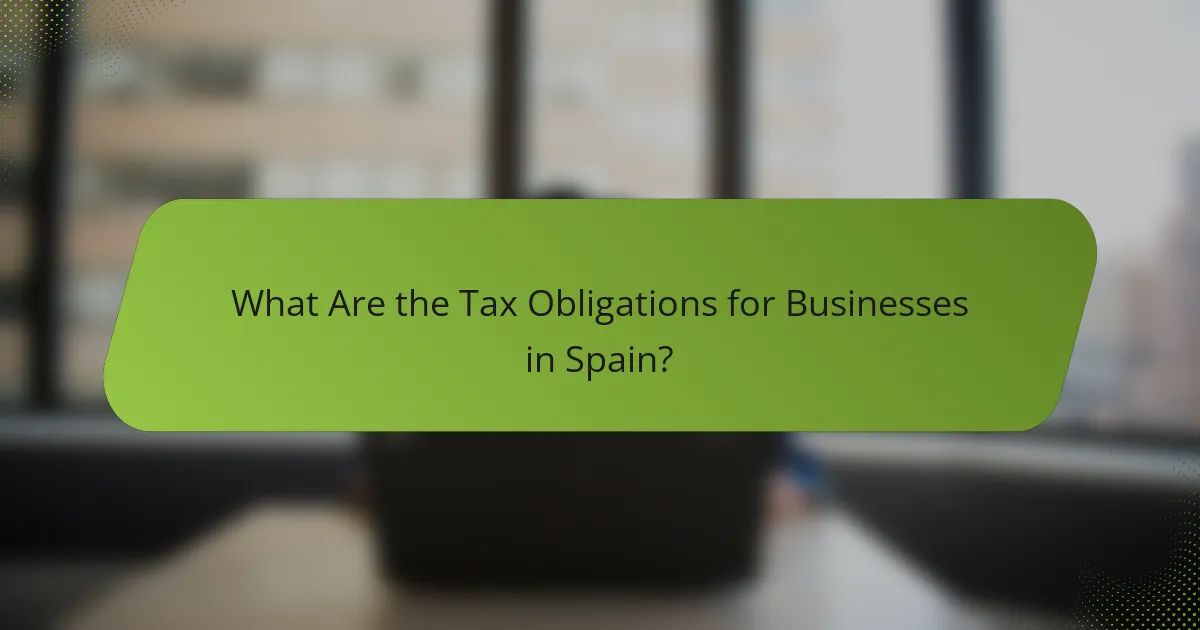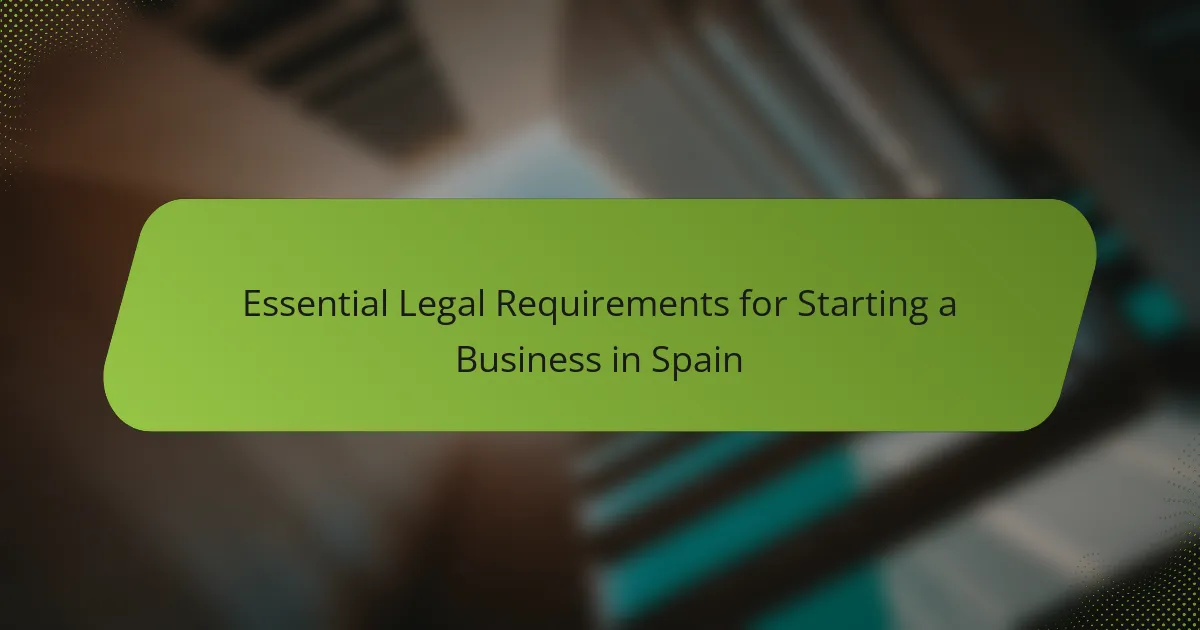Starting a business in Spain requires navigating essential legal requirements to ensure compliance with local regulations. This includes registering your business, obtaining a tax identification number, and securing the necessary licenses. Entrepreneurs must also choose an appropriate business structure, such as a sole proprietorship or a limited liability company, each with its own legal and tax implications.

What Are the Essential Legal Requirements for Starting a Business in Spain?
Starting a business in Spain involves several essential legal requirements that ensure compliance with local regulations. Key steps include registering your business, obtaining necessary identification numbers, and securing licenses.
Business registration with the Mercantile Registry
To legally operate a business in Spain, you must register with the Mercantile Registry (Registro Mercantil). This process involves submitting your company’s articles of incorporation and other relevant documents.
Registration typically takes a few weeks and requires a fee that varies based on the type of business entity. Once registered, your business gains legal recognition and can operate officially.
Obtaining a tax identification number (NIF)
Every business in Spain needs a tax identification number (Número de Identificación Fiscal, NIF) to conduct financial transactions and fulfill tax obligations. This number is essential for invoicing and tax reporting.
To obtain a NIF, you must apply through the Spanish Tax Agency (Agencia Tributaria). The process is straightforward and can often be completed online or in person, typically taking a few days.
Complying with local business licenses
Depending on your business type and location, you may need specific local licenses or permits to operate legally. These can include municipal licenses, health permits, or environmental clearances.
Check with your local town hall (ayuntamiento) for the exact requirements, as they can vary significantly. Failing to secure the necessary licenses can lead to fines or business closure.
Registering for social security
All businesses in Spain must register with the Social Security system (Seguridad Social) to ensure compliance with employee welfare regulations. This registration is crucial for providing social benefits to employees.
The process involves submitting relevant documentation about your business and its employees. Registration should be completed before hiring any staff to avoid penalties.
Opening a business bank account
Establishing a business bank account is vital for managing finances and separating personal and business expenses. Most banks in Spain require proof of business registration and a NIF to open an account.
Consider comparing different banks for fees and services offered, as these can vary. A dedicated business account simplifies tax reporting and financial management, making it a necessary step for any entrepreneur.

How Do I Register a Business in Spain?
To register a business in Spain, you must follow a series of legal steps to ensure compliance with local regulations. This process typically involves obtaining a tax identification number, registering with the commercial registry, and fulfilling various documentation requirements.
Steps for registration process
The registration process in Spain generally starts with obtaining a Número de Identificación de Extranjero (NIE) for foreign entrepreneurs. Next, you need to apply for a tax identification number (CIF) at the Agencia Tributaria. After that, you will register your business with the local commercial registry, which involves submitting your business name and legal structure.
Once registered, you must also register for social security and obtain any necessary licenses or permits depending on your business type. It is advisable to consult with a local lawyer or business advisor to navigate these steps efficiently.
Required documentation
The documentation required for business registration in Spain includes your NIE, a completed application form, and proof of your business address. Additionally, you will need to provide a declaration of the business name and the articles of association if applicable.
For certain business types, additional permits or licenses may be required, such as health permits for food-related businesses. Ensure all documents are in Spanish and properly notarized to avoid delays.
Timeframe for registration
The timeframe for registering a business in Spain can vary, but it typically takes between two to four weeks to complete the entire process. Factors such as the type of business and the completeness of your documentation can influence this duration.
To expedite the process, ensure that all required documents are prepared in advance and consider using professional services to assist with the registration. This can help you avoid common pitfalls that lead to delays.

What Types of Business Structures Are Available in Spain?
In Spain, entrepreneurs can choose from several business structures, each with distinct legal implications, tax responsibilities, and operational requirements. The most common types include sole proprietorships, limited liability companies (SL), and public limited companies (SA).
Sole proprietorship
A sole proprietorship, or “autónomo,” is the simplest business structure in Spain, allowing an individual to operate a business without forming a separate legal entity. This structure is ideal for freelancers and small business owners due to its straightforward setup and minimal regulatory requirements.
To establish a sole proprietorship, you need to register with the Tax Agency (Agencia Tributaria) and obtain a tax identification number (NIF). Keep in mind that as a sole proprietor, you are personally liable for all business debts, which can pose a financial risk.
Limited liability company (SL)
A limited liability company (Sociedad Limitada or SL) is a popular choice for small to medium-sized businesses in Spain. This structure limits the personal liability of its owners, meaning that their personal assets are generally protected from business debts.
To form an SL, you need a minimum share capital of €3,000, which must be fully paid up at the time of incorporation. The process involves drafting the company’s bylaws, registering with the Commercial Registry, and obtaining a tax identification number. An SL is suitable for businesses looking to grow while managing risk.
Public limited company (SA)
A public limited company (Sociedad Anónima or SA) is designed for larger businesses that may wish to raise capital through public investment. This structure requires a minimum share capital of €60,000, with at least 25% paid up at incorporation.
Establishing an SA involves more complex regulations, including the need for a board of directors and stricter reporting requirements. This structure is ideal for companies aiming for significant growth and public trading, but it comes with higher administrative burdens and costs.

What Are the Tax Obligations for Businesses in Spain?
Businesses in Spain must comply with several tax obligations, including corporate tax, value-added tax (VAT), and various local taxes. Understanding these requirements is crucial for legal compliance and financial planning.
Corporate tax rates
The standard corporate tax rate in Spain is around 25%, although newly established companies may benefit from a reduced rate of 15% for the first two years of profit. It’s essential to consider any applicable deductions or credits that can lower the effective tax rate.
Businesses should also be aware of the special tax regime for certain sectors, such as cooperatives or non-profit organizations, which may have different rates. Consulting with a tax advisor can help navigate these complexities.
Value-added tax (VAT) registration
In Spain, businesses must register for VAT if their taxable turnover exceeds a certain threshold, typically around €85,000 annually. The standard VAT rate is 21%, but reduced rates of 10% and 4% apply to specific goods and services.
Once registered, businesses must file periodic VAT returns, detailing the VAT collected from sales and the VAT paid on purchases. Failure to comply with VAT regulations can result in penalties, so timely registration and accurate reporting are crucial.
Local taxes and fees
In addition to national taxes, businesses in Spain are subject to various local taxes and fees, which can vary significantly by municipality. Common local taxes include property tax (IBI) and business activity tax (IAE).
It’s important to check with local authorities to understand specific obligations, as some regions may offer incentives or exemptions. Keeping track of local regulations ensures compliance and can help avoid unexpected costs.

What Are the Employment Laws in Spain?
Employment laws in Spain are designed to protect workers’ rights and ensure fair treatment in the workplace. These laws cover various aspects, including employee contracts, minimum wage, working hours, and termination procedures.
Employee contracts and rights
In Spain, every employee must have a written contract that outlines the terms of employment, including job responsibilities, salary, and duration of the contract. Contracts can be indefinite or fixed-term, with specific regulations governing each type.
Employees have rights to various benefits, such as paid leave, sick leave, and protection against unfair dismissal. It’s crucial for employers to understand these rights to avoid legal disputes and ensure compliance with labor laws.
Minimum wage regulations
The minimum wage in Spain is set annually and applies to all employees, regardless of their contract type. As of 2023, the minimum wage is approximately €1,000 per month, which translates to around €14,000 annually for full-time workers.
Employers must ensure that they pay at least this minimum wage, as failing to do so can result in significant penalties. Additionally, collective agreements may set higher minimum wages in specific sectors, so it’s important for businesses to stay informed about applicable regulations.
